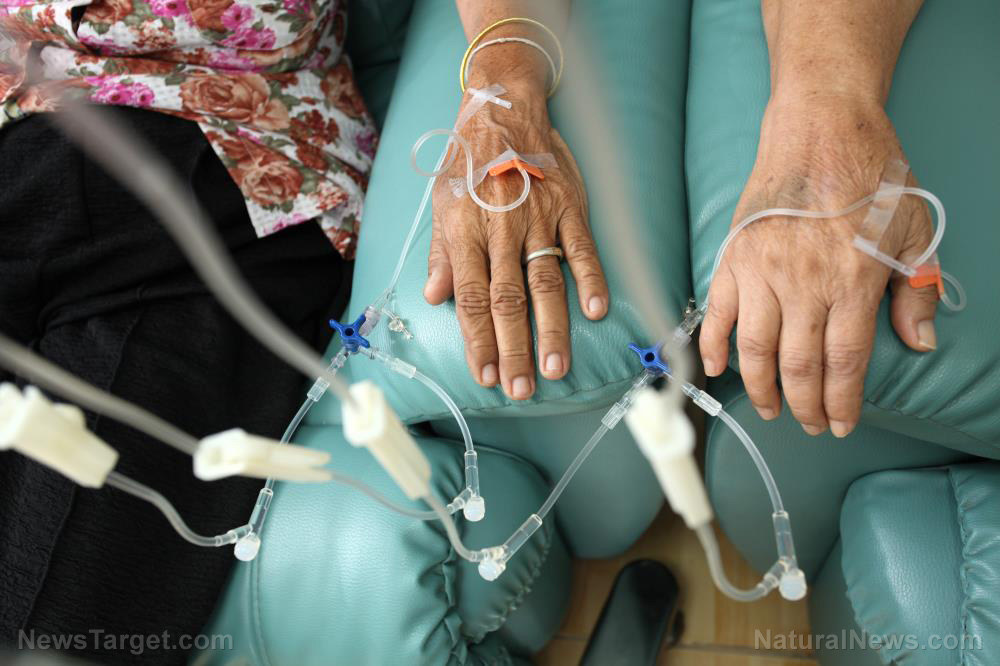Some “treatment”: Chemotherapy promotes muscle mitochondrial dysfunction
01/25/2019 / By Ralph Flores

Chemotherapy has been the standard of care for most types of cancer, and it’s been used for well over half a century; however, recent studies have shown that it also causes irreparable harm to a person’s body. In a study published in the American Journal of Physiology’s Cell Physiology, scientists have found that the procedure can negatively impact skeletal muscles, leading to dysfunctions on a cellular level. The research, led by the University of Vermont, looked at how chemotherapeutic drugs affect skeletal muscle structure and protein expression in cancer patients.
For the study, the researchers involved 13 women who were diagnosed with breast cancer and who were undergoing adjuvant therapy for the disease. After an examination, they found that the patients had reduced muscle fiber, as well as limited subsarcolemmal and intermyofibrillar mitochondria which are essential for healthy cell activity. In particular, the team noted that doxorubicin and paclitaxel, which are commonly used to treat breast cancer, are responsible for the loss of mitochondrial expression. The two drugs also contributed to increased levels of reactive oxygen species, which can result in cell damage. Moreover, the drugs also led to the oxidation of peroxiredoxin 3, leading to damages in the muscle fiber.
According to the researchers, the adverse effect of chemotherapy drugs on the mitochondria “provides a possible explanation for the high prevalence of fatigue and functional disability across all cancer types, including those not typically characterized by cachexia, such as breast cancer.”

“Interventions designed to counter these effects on muscle may help alleviate some of the burden of the disease on patients,” they added. (Related: Chemotherapy found to SPREAD cancer throughout the body, warn scientists.)
Chemotherapy isn’t just harmful, it’s downright lethal
One of the words often associated with cancer is chemotherapy, with many people thinking that the latter is a potent form of treatment. Indeed, conventional physicians might tout it to be an effective way to deal with cancer, but what they fail to mention is that the treatment is also associated with cancer promotion.
In a study published by the Beth Israel Deaconess Center, scientists have found that chemotherapy and radiation — both of which are heavily used in cancer treatment — can actually cause tumors to become larger and more prolific. These treatments, according to the authors, promote inflammation, a leading contributor to the development of cancerous tumors.
“In this study, we demonstrate that chemotherapy-generated debris from dead and dying tumor cells can stimulate tumor growth, which has pivotal implications for the treatment of cancer patients,” wrote Dr. Dipak Panigrahy, a senior author of the study. “Conventional cancer therapy designed to kill tumor cells is inherently a double-edged sword.”
This supports the findings made by another study, titled Neoadjuvant chemotherapy induces breast cancer metastasis through a TMEM-mediated mechanism, which revealed that chemotherapy is responsible for the spread of cancer cells — a far cry from its purported goal.
If these life-threatening symptoms aren’t enough, patients can also expect the following side effects after chemotherapy.
- Brain fog. The condition, also called “chemo brain,” can result in problems with memory and increase a person’s anxiety.
- Anxiety and depression. Chemotherapy can take a toll on a person and can usually lead to overwhelming anxiety or depression.
- Weakened heart. People who have a pre-existing condition or cardiovascular disease are at risk since chemotherapy can weaken the heart muscles.
- Hair loss. This is one of the most noticeable symptoms following chemotherapy and is caused by the hair follicles being damaged by the treatment.
Sources include:
Submit a correction >>
Tagged Under:
doxorubicin, paclitaxel
This article may contain statements that reflect the opinion of the author




















